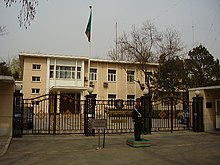China–Zambia relations
 | |
China |
Zambia |
|---|---|
People's Republic of China – Zambia relations refers to the current and historical relationship between the People's Republic of China (PRC) and Zambia.
Economic relations[]
The Chinese investors had complaints, as a Zambian newspaper reported: “the Zambian government’s rigid control over expatriate staff, high transportation costs due to its landlocked position and poor infrastructure, discriminatory incentives, complicated labour relations laws, frequent strikes by workers, and poor local industries were not helping investors.”[1]: 5

In 1998 China Non-Ferrous Metals Corporation (CNMC) bought a controlling 85 percent stake in Zambia's Chambishi copper mine for US$20 million (US$27 million in 2011 dollars[2]) and invested a further US$130 million in rehabilitating the mine. Less than ten years later by the end of 2005 roughly 160 Chinese companies had invested in Zambia.
Trade between China and Zambia increase in 2010 to US$2.2 billion. Chinese investments in Zambia range from mining interests in Zambia's copper belt to investments in agriculture, manufacturing, and tourism. As of February 2011 a total of 25 farms in Zambia are being run by Chinese entities.[3]
Chinese development finance to Zambia[]
From 2000 to 2011, there are approximately 64 Chinese official development finance projects identified in Zambia through various media reports.[4] These projects range from a loan to fund Kafue George Lower power project,[5] to a loan for expanding the Kariba North bank power station near Siavonga,[6] or a US$211 million debt relief in 2006.[7]
Human rights[]
In June 2020, Zambia was one of 53 countries that backed the Hong Kong national security law at the United Nations.[8]
Controversies[]
Fifty-one employees at a Chinese-owned explosives plant were killed in an explosion in April 2005. The following year a riot broke out at the Chambishi mine. The next day a Zambian worker was shot and wounded leading to the storming of the Chinese residential compound and another five workers were shot and wounded by a panicked Chinese manager. The explosion at the explosives plant and the events at Chambishi mine became one of biggest issues in the 2006 Zambian presidential elections. With opposition candidate, Michael Sata, taking an anti-PRC stance, stating that were he to win the election, he would renounce Zambia's recognition of the PRC and recognize the Republic of China in Taiwan.[1]: 5–6 Sata lost the election to then-incumbent president Levy Mwanawasa.
In February 2007 the Chinese government sought to mitigate anti-PRC feeling in Chambishi by promising to invest US$800 million into the creation of a Sino-Zambian economic zone and help the country to industrialize.[1]: 5
Collum Coal Mine[]
In February 2010 a Chinese supervisor, Zhong Tinghui, was killed at the privately owned Collum Coal Mine. In October that year, two Chinese managers opened fire on African mine workers during a riot at the mine and injured 11. In early August 2012 Chinese mine manager, Wu Shengzai, was killed following a pay dispute.[9]
Bibliography[]
- Cardenal, Juan Pablo; Araújo, Heriberto (2011). La silenciosa conquista china (in Spanish). Barcelona: Crítica. pp. 194–201. ISBN 9788498922578.
References[]
- ^ a b c Brautigam, Deborah (2009). The Dragon's Gift:The Real Story of China in Africa. New York: Oxford University Press. pp. 397. ISBN 978-0-19-955022-7.
- ^ Measuring Worth, Relative Value of a U.S. Dollar Amount - unskilled wage, retrieved on the 26/01/2011
- ^ "If you want to grow as Zambia, work with us, says China". Zambia Watch. 8 February 2011. Archived from the original on 9 October 2011. Retrieved 9 February 2011.
- ^ Austin Strange, Bradley C. Parks, Michael J. Tierney, Andreas Fuchs, Axel Dreher, and Vijaya Ramachandran. 2013. China's Development Finance to Africa: A Media-Based Approach to Data Collection. CGD Working Paper 323. Washington DC: Center for Global Development.[1]
- ^ Strange, Parks, Tierney, Fuchs, Dreher, and Ramachandran, China's Development Finance to Africa: A Media-Based Approach to Data Collection.http://aiddatachina.org/projects/2244
- ^ Strange, Parks, Tierney, Fuchs, Dreher, and Ramachandran, China's Development Finance to Africa: A Media-Based Approach to Data Collection.http://aiddatachina.org/projects/354
- ^ Strange, Parks, Tierney, Fuchs, Dreher, and Ramachandran, China's Development Finance to Africa: A Media-Based Approach to Data Collection.http://aiddatachina.org/projects/2272
- ^ Lawler, Dave (2 July 2020). "The 53 countries supporting China's crackdown on Hong Kong". Axios. Retrieved 3 July 2020.
- ^ Zhang Boling and He Xin (August 20, 2012). "The Killing of a Miner in Zambia". Caixin. Retrieved August 22, 2012.
External links[]
- Zambia: Professor Chirwa applauds Chinese investment , 1 February 2011
- China–Zambia relations
- Africa–China relations
- Bilateral relations of China
- Bilateral relations of Zambia

